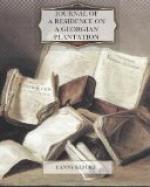of pillow for his dying agony, two or three rough
sticks just raising his skull a few inches from the
ground. The flies were all gathering around his
mouth, and not a creature was near him. There
he lay,—the worn-out slave, whose life
had been spent in unrequited labour for me and mine,—without
one physical alleviation, one Christian solace, one
human sympathy, to cheer him in his extremity,—panting
out the last breath of his wretched existence, like
some forsaken, over-worked, wearied-out beast of burthen,
rotting where it falls! I bent over the poor awful
human creature in the supreme hour of his mortality;
and while my eyes, blinded with tears of unavailing
pity and horror, were fixed upon him, there was a
sudden quivering of the eyelids and falling of the
jaw,—and he was free. I stood up,
and remained long lost in the imagination of the change
that creature had undergone, and in the tremendous
overwhelming consciousness of the deliverance God had
granted the soul whose cast-off vesture of decay lay
at my feet. How I rejoiced for him—and
how, as I turned to the wretches who were calling to
me from the inner room, whence they could see me as
I stood contemplating the piteous object, I wished
they all were gone away with him, the delivered, the
freed by death from bitter bitter bondage. In
the next room, I found a miserable, decrepid, old
negress, called Charity, lying sick, and I should
think near too to die; but she did not think her work
was over, much as she looked unfit for further work
on earth; but with feeble voice and beseeching hands
implored me to have her work lightened when she was
sent back to it from the hospital. She is one
of the oldest slaves on the plantation, and has to
walk to her field labour, and back again at night,
a distance of nearly four miles. There were an
unusual number of sick women in the room to-day; among
them quite a young girl, daughter of Boatman Quash’s,
with a sick baby, who has a father, though she has
no husband. Poor thing! she looks like a mere
child herself. I returned home so very sad and
heart-sick that I could not rouse myself to the effort
of going up to St. Annie’s with the presents
I had promised the people there. I sent M——
up in the wood wagon with them, and remained in the
house with my thoughts, which were none of the merriest.
* * * *
*
Dearest E——. On Friday, I rode
to where the rattlesnake was found, and where I was
informed by the negroes there was a nest of
them—a pleasing domestic picture of home
and infancy that word suggests, not altogether appropriate
to rattlesnakes, I think. On horseback I felt
bold to accomplish this adventure, which I certainly
should not have attempted on foot; however, I could
discover no sign of either snake or nest—(perhaps
it is of the nature of a mare’s nest, and undiscoverable);
but, having done my duty by myself in endeavouring
to find it, I rode off and coasted the estate by the
side of the marsh, till I came to the causeway.
There I found a new cleared field, and stopped to
admire the beautiful appearance of the stumps of the
trees scattered all about it, and wreathed and garlanded
with the most profuse and fantastic growth of various
plants—wild roses being among the most abundant.
What a lovely aspect one side of nature presents here,
and how hideous is the other!




